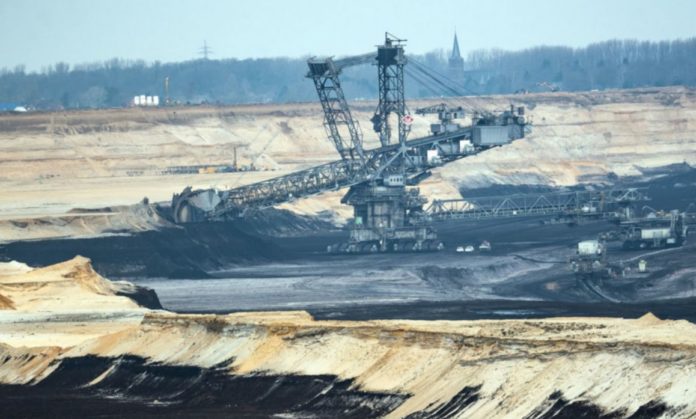A detailed new case study, titled Banking on Climate Chaos, released Wednesday by Rainforest Action Network reveals that the world’s 60 largest banks have crushed more than $3.8 trillion into the fossil fuel industry since 2015, financing for projects from Indonesia’s coal-fueled power plants to Line 3 tar sands pipeline of Enbridge.
“Many of the world’s largest banks, including all six major U.S. banks, have made splashy commitments in recent months to zero-out the climate impact of their financing over the next 30 years. But what matters most is what they’re doing now, and the numbers don’t lie,” says Ben Cushing, campaign manager with the Sierra Club.
- Scientists in Fear of This New Predator From Red Sea Eating Native Species in Mediterranean
- Does This Mean We Stopped Being Animal and Started Being Human Due to ‘Copy Paste’ Errors?
- The One Lifestyle Choice That Could Reduce Your Heart Disease Risk By More Than 22%
- Aging: This Is What Happens Inside Your Body Right After Exercise
- Immune-Boosting Drink that Mimics Fasting to Reduce Fat – Scientists ‘Were Surprised’ By New Findings
The 80-page, titled Banking on Climate Chaos, report points out that banks like Bank of America, Citibank including JPMorgan Chase, and Wells Fargo have poured more money for the fossil fuel sector than any other banks in the world at a time when scientists are warning of the fact that fossil fuel extraction and its use must be rapidly curtailed to save the earth from environmental catastrophe.
According to the report, between 2016 and 2020, Chase’s lending and underwriting activities have dumped nearly $317 billion into fossil fuels—funding that casts serious doubt on the massive bank’s promise last October to align its financing commitments with the Paris Agreement’s climate targets.
“We must understand that by bankrolling the expansion of oil and gas, the top banks of the world have blood on their hands and no amount of greenwashing, carbon markets, unproven techno-fixes, or net-zero commitments can absolve their crimes against humanity and Mother Earth,” says Tom Goldtooth, executive director of the Indigenous Environmental Network (IEN).
“Indigenous lands globally are being plundered, our inherent rights are being violated, and the value of our lives has been diminished to nothing in the face of fossil fuel expansion,” Goldtooth added.
“For the sacredness and the territorial integrity of Mother Earth, these banks must be held accountable for covering the cost of her destruction.”
In 2020 alone, amid a global pandemic, the world’s 60 largest banks increased by over 10% their financing for the 100 companies most responsible for fossil fuel expansion around the world, including BP, Shell, ConocoPhillips, Equinor, and Enbridge, according to the new report.
???? BREAKING: New report shows that in the 5 years after the Paris Agreement was adopted, the world’s 60 largest private banks pumped over *$3.8 TRILLION* into the fossil fuel industry.
— Ben Cushing (@bmcushing) March 24, 2021
Learn more ➡️ https://t.co/94gjCyCG9V
Time to #StopTheMoneyPipeline & #DefundClimateChange. pic.twitter.com/BYntFQsPi9
Assembled by the Rainforest Action Network, Oil Change International, IEN, and other advocacy groups, the report argues that banks must take a number of concrete steps in order to truly bring their practices into line with what the science says is necessary to ensure a livable and sustainable future:
- Prohibit all financing for all fossil fuel expansion projects and for all companies expanding fossil fuel extraction and infrastructure along the whole value chain;
- Commit to phase out all financing for fossil fuel extraction, combustion, and infrastructure, on an explicit timeline that is aligned with limiting global warming to 1.5°C, starting with coal mining and coal power, as well as financing for existing projects and companies active in tar sands oil, Arctic oil and gas, offshore oil and gas, fracked oil and gas, and LNG. As part of this commitment, require fossil fuel clients to publish plans to phase out fossil fuel activity on a 1.5°C-aligned timeline;
- Commit to measure, disclose, and set targets to zero out the absolute climate impact of their overall financing activities on a 1.5°C-aligned timeline, including short-, medium-, and long-term targets; and
- Fully respect all human rights, particularly the rights of Indigenous Peoples, including their rights to their water and lands and the right to Free, Prior, and Informed Consent, as articulated in the UN Declaration on the Rights of Indigenous Peoples. Prohibit all financing for projects and companies that abuse human rights, including Indigenous rights.
- Scientists in Fear of This New Predator From Red Sea Eating Native Species in Mediterranean
- Does This Mean We Stopped Being Animal and Started Being Human Due to ‘Copy Paste’ Errors?
- The One Lifestyle Choice That Could Reduce Your Heart Disease Risk By More Than 22%
- Aging: This Is What Happens Inside Your Body Right After Exercise
- Immune-Boosting Drink that Mimics Fasting to Reduce Fat – Scientists ‘Were Surprised’ By New Findings
“This report serves as a reality check for banks that think that vague ‘net-zero’ goals are enough to stop the climate crisis,” said Lorne Stockman, senior research analyst at Oil Change International. “Our future goes where the money flows, and in 2020 these banks have ploughed billions into locking us into further climate chaos. Banks need to be focused on reducing fossil fuel production now, rather than on a far off and insufficient goal in the distant future.”
“The time for half-measures is over,” Stockman added.
